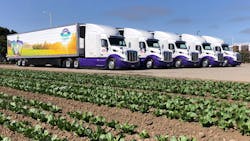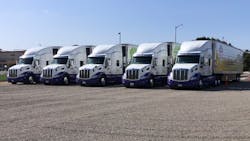When it comes to “farm fresh,” you’d be hard-pressed to find a produce grower and shipper that takes it to heart more than Bonita Packing/Betteravia Farms and sister company Alco Harvesting. Based in Santa Maria, California, the companies sell and transport more than 20 million cartons of fresh vegetables annually to customers on the West Coast and in Arizona. With that business commitment comes the need for a highly reliable fleet.
Since 2018, Alco has relied on a leased fleet from PacLease and now operates 33 Peterbilt Model 579s with additional units on order. The tractors are equipped with Paccar MX-13 engines and TX-12 automated transmissions.
“We were outsourcing loads, but we needed more control over our trucking operation from price, control, and on-time delivery standpoints,” said Jeremy MacKenzie, general manager of Alco Harvesting and VP of harvesting for Bonita Packing. “We looked into truck ownership, but the expense of buying equipment and setting up a shop made us consider leasing.”
See also: The truth about cost per mile, leasing
Just as important to MacKenzie is a dedicated pool of drivers. “While the driver shortage can be an issue for us, we’re very competitive as a place to work because we guarantee that all drivers return home every night, and we offer excellent pay and benefits,” he said. “In addition, few agricultural products companies in our operating areas offer relatively new trucks. All of those things have led to a very high driver retention rate.”Alco drivers also receive regular training. For example, PacLease provides courses on automated manual transmission operation, a new specification for the fleet’s vehicles, and practices that drive up fuel efficiency. The company’s insurance carrier offers training that has led to fewer injuries and consequently fewer claims and lower workers’ compensation costs. Additionally, the California Highway Patrol has instructed Alco’s drivers on proper load securement and other safe operating practices that have helped reduce CSA violations.
“We’re also benefiting from our decision to deploy Samsara onboard technology,” MacKenzie added. “We’ve had several instances where forward- and rear-facing cameras have proven that our driver was not at fault in an accident. They also promote seat belt use and eliminate cellphone activity while driving by sounding an alarm if a driver isn’t wearing the belt or uses a phone. The system generates scorecards as well, which we use as part of a safety bonus program.”
See also: Adding new technology requires driver buy-in, communication
Technology also is under development at Alco to improve its load management activities. Using a custom-built system called Harvest Track, the company will have visibility into loads being built in fields, information it can use to route trucks more effectively.
“Our fleet rotates from field to field and loads 140 to 160 trailers a day,” said Will Hames, operations manager for Alco Harvesting. “Before, we had to call drivers when produce was ready to be picked up, and they often spent a lot of time driving a loop.”
“This way, however, we can streamline the process and operate more efficiently and productively,” Hames added. “Once you cut a head of lettuce, it starts dying but now our rejection rate is going to be much lower because product is not waiting in the field to be picked up and brought to a cooler.”
According to MacKenzie, another part of the equation that’s bringing fresh produce to store shelves is the uptime ensured by PacLease. “They service our fleet in California and Arizona,” he said. “That includes mobile maintenance so we can keep trucks moving without needing to bring them to a shop. PacLease also provides replacement trucks in the event of extended downtime for any leased unit.”
The Alco fleet mainly pulls 26-ft. field trailers manufactured by Denair Trailer Manufacturing that can be loaded with 12 pallets, each of which holds between 40 and 56 cartons of produce. The company also operates berry trucks, which are Peterbilt Model 220 cabovers with flatbeds that can carry up to 24 pallets.
“We’re quite diverse,” MacKenzie said. “We grow produce in California most of the year, and from November through April our harvest also comes from Arizona. With the right fleet, we can control the transportation and distribution more effectively to ensure consumers receive the freshest produce possible.”
About the Author

Seth Skydel
Seth Skydel, a veteran industry editor, has more than four decades of experience in fleet management, trucking, and transportation and logistics publications. Today, in editorial and marketing roles, he writes about fleet, service, and transportation management, vehicle and information technology, and industry trends and issues.

